44 Search Results for teenage
June 4, 2013
by Carole Zangari -
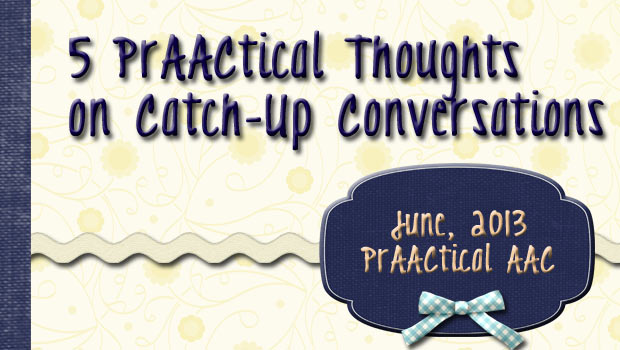
One of the things SLPs frequently do at the start of their therapy sessions is have some casual conversations with their clients to catch up on what happened since their last visit. Whether it is an elementary school student with ASD, a teenager with cerebral palsy, or an older adult with aphasia, we engage in polite conversation to find out what they’ve been up to and perhaps share a bit about our own experiences. Here are some thoughts on making those ‘catch-up conversations’ work from a prAACtical perspective. 1. Possible goal areas: initiate conversation; maintain dialogue on an established topic; redirect conversation to a new topic; respond to non-obligatory communication opportunities; use temporal terms in multi-word utterances; convey a personal narrative with a clear beginning, middle, and end; use regular past tense verbs; ask partner-focused questions 2. Core language targets: it, we, they, do/did, have/had, was/were, not It was (not);... [Read More...]
May 20, 2013
by Carole Zangari -
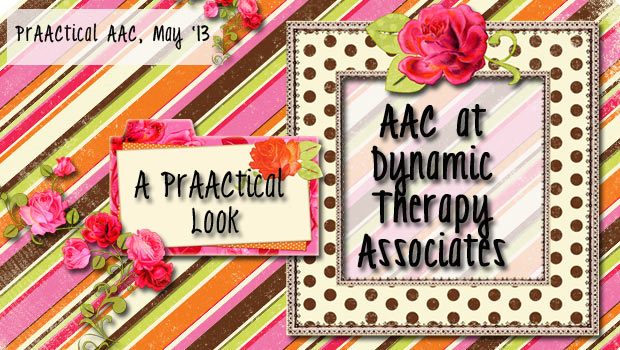
We’re so excited to continue our PrAACtical Look series with a guest post from Vicki Clarke, who is the CEO of Dynamic Therapy Associates, a speech language therapy clinic in Kennesaw, Georgia. Vicki specializes in AAC, conducting local and national device evaluations, consultations, treatments and trainings for individuals, clinics, school systems and professional organizations and manufacturers. Vicki has a wealth of knowledge in the prAACtical aspect of AAC service provision and shares a tiny bit of that with us in this post about preparing clients who use AAC for medical encounters. :::::::::::::::::::::::::::::::::::::::::::::::::::::::::::::::::::::::::::::::::::::::::::::::::::: I was asked to contribute a “favorite therapy activity” kind of post to this blog a few months ago. Decisions, decisions, decisions….I love Arts & Crafts Therapy, Cooking Therapy, iPad Therapy, Shopping Therapy, and Hang-Around-And-Chat Therapy but what to share? I mulled it over and I decided on “Serious Medical Procedure Preparation Therapy.” Fun stuff, right?!!? We do a lot... [Read More...]
March 2, 2013
by Carole Zangari -
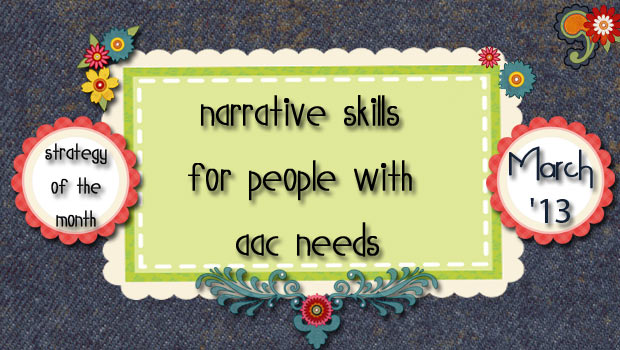
This month, we’ll share some thoughts about helping people with AAC needs develop narrative skills. Why narrative skills? Because they help us connect to one another and communication learning works best when we feel connected. Among other things, storytelling helps us relate to one another. Narrative language is important for reading and writing skills to develop. It helps us understand the world and ourselves. In telling our stories, we establish our identities. Plus, it’s part of what makes life fun. In the US, pediatric therapists are having lots of conversations about the Common Core State Standards (CCSS) in English Language Arts (ELA), and how they relate to the IEP goals of the students that they serve. Many of the goals in the ELA speaking domain require students to be able to summarize what they hear and read, so it is no surprise that SLPs are prioritizing narrative language and related... [Read More...]
December 29, 2012
by Carole Zangari -
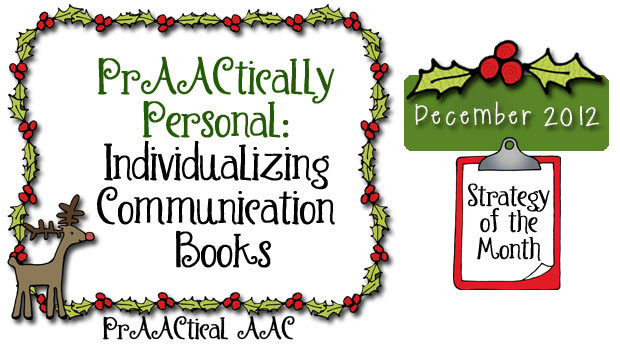
Custom tailored suit or off the shelf? Shoes that pinch or ones that are just snug? It stands to reason that when something fits well, we are more likely to wear it. Communication books, like clothes, have to ‘fit’ the user. But what does that really mean? When we’re ‘tailoring’ a communication book for someone who is learning to use AAC, there are three areas that we think about: How it looks, what it has inside, and how it ‘sounds.’ Appearance & Aesthetics As we’ve said before, everyone deserves communication tools that look great. Communication books should reflect the style and personality of the person who’ll be using it. Customizing a communication book doesn’t need to be expensive. You can use special papers for the cover or pages, and stickers to decorate. Here are some ideas to get you started. Send them shopping: There’s nothing that speaks to ownership like... [Read More...]
December 10, 2012
by Carole Zangari -
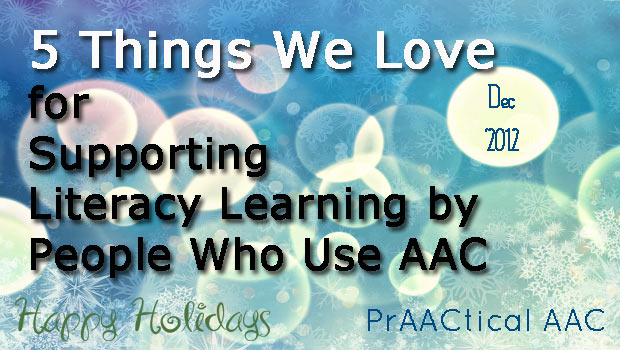
The joys of being able to read and write should be made available to everyone. No matter what the type or extent of disabling condition, it is now known that we can be effective in teaching real literacy skills. While not every learner gets to the same point in the journey, all augmentative communicators have the right to high expectations and quality instruction. There are lots of wonderful literacy support programs that have emerged in the past decade. Here are five to to take a (second) look at. Bookshare: An accessible book service available without charge to US students who have disabilities that impede their ability to use print effectively. Schools and other organizations can also register. This video says, um raps, it all. Some of our favorite people with AAC needs grew up in an era where they had no legal right to attend public school or did attend... [Read More...]
August 27, 2012
by Carole Zangari -
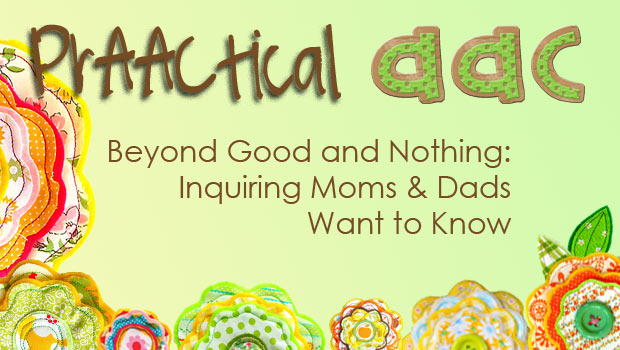
“How was school?” (Good) “What did you do?” (Nothing) This scenario plays out in many cars and kitchens in the after school hours and it can be hard to know who is more frustrated: the kids for being asked or the parents for not getting satisfactory answers. And still, we repeat the process day after day. Of course, we want to know the fine details of what happened and how our children felt, but in some cases, we’d settle for ANY school-related conversation at all. I’ll be the first to admit that it took me way too long to get the hang of how to get information about my children’s school days, and it seemed like just when I did, pow! They were pre-teens and then teenagers. New rule book. Here are some ‘lessons learned’ along the way about those afterschool conversations and some suggestions for parents of the kids... [Read More...]
July 28, 2012
by Robin Parker -
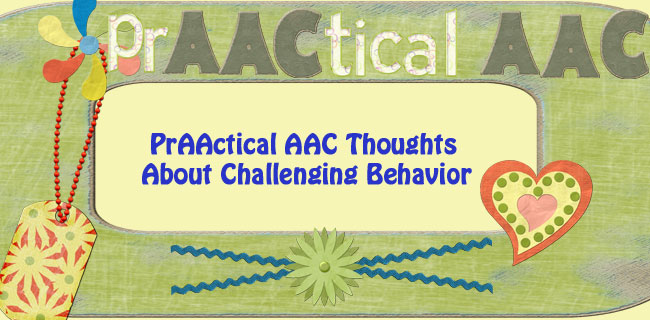
Some PrAACtical AAC thoughts about challenging behavior: I wonder if it is ok to say that we love seeing challenging behavior during speech-language therapy sessions or observations. Well, I said it, both of us do, because if we really ‘listen’ then we can figure out what to teach that will really help our students. We tend to prioritize our goals into High Priority and General Priority. Challenging behavior and the communication message behind it, definitely falls into high priority. This is because challenging behavior in students limits experiences, limits interaction, and overall limits opportunities for people to get to know you. Consider Challenging Behavior through Communication Glasses Is it really Challenging Behavior? behavior that is or can be destructive or hurtful. Examples include but are not limited to: hitting, biting, spitting, throwing, pounding, etc. (Note: we are not talking about poor eye contact or poor attention to task or even laughing... [Read More...]
July 14, 2012
by Robin Parker -
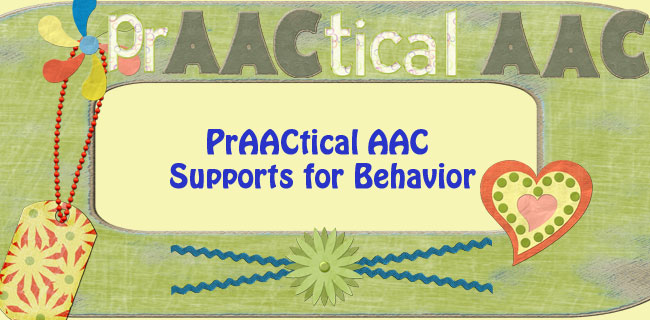
Our July Strategy of the Month, PrAActical AAC Supports for Behavior, is a favorite topic for us, because with a little planning, we can adhere to the old adage that an ‘ounce of prevention is worth a pound of cure’ (as Carole said last week). We also find that behavior challenges are often one of the main reasons, our students (and colleagues) get stressed about working with children with significant communication impairments. And since stress for ANYONE does not make for an optimal learning environment, we love to show how effective preventative strategies work. This week we are focusing on ‘setting the stage’ for conventional and appropriate behavior by engineering the physical environment. We are talking about more than keeping the room neat, clean, and generally organized. We are talking about arranging the physical environment in a planned and careful way in order can make a huge difference in helping... [Read More...]
June 14, 2012
by Robin Parker -
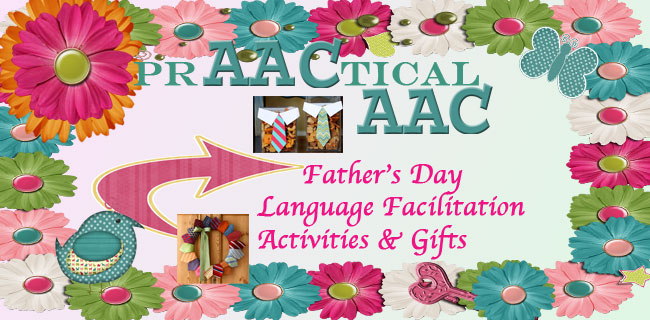
Father’s Day is almost here. We love celebrating fathers and/or the positive male role model in our students lives. The reason we celebrate a variety of ‘father figures’ is that we want to include ALL of our students. So we celebrate grandfathers, uncles, godfathers, husbands, brothers, or any other male the child feels represents a ‘father’ figure. Speech-language pathologists tend to love holidays and art projects. Communication and language is learned in real (authentic) activities. So we found some great Father’s Day Crafts that we are using to facilitate communication/language AND to give ‘dads’ a great home-made gift. Remember though with a little AAC training, Anything we can do, families can do better and more often at home… Dad Tie Snack Jar Candy Bar Letter Tie Wreath Photo Collages Possible Goals (but limitless): requesting with adjectives– ‘want blue crayon’; ‘can I have striped tie?’; ‘need wood glue’ commenting– ‘pretty’; ‘that’s... [Read More...]
May 17, 2012
by Carole Zangari -
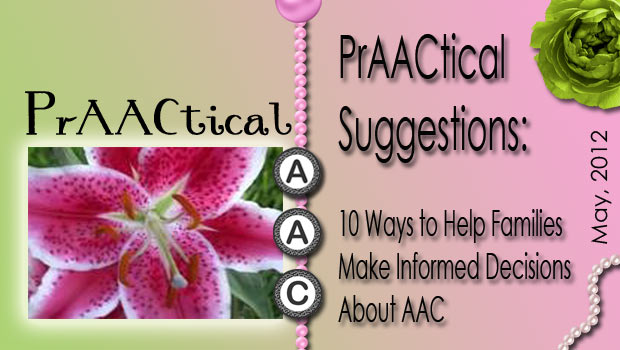
– In one of my AAC classes, we’ve been talking about how to help families make informed decisions. To do that, they need to have solid information presented clearly, in digestible bites from a trusted source. When we don’t have that information, it is easy to fall prey to fads and/or adopt a herd mentality and do what everyone else is doing. Here are some suggestions for supporting families through the AAC decisions they will need to make. – 1. Have direct conversations about the pros and cons of the available options. For example, if the family expressed interest in an iPad with AAC apps over a full fledged SGD, then we’d have to be prepared to reiterate the merits and drawbacks of each. 2. Share a process for making AAC decisions rather than attempting to take the decision out of their hands. For example, you may want to encourage... [Read More...]









